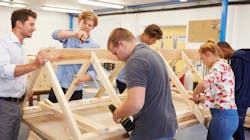The Home Building Industry Is Hiring
As a new school year approaches, parents and students across the country are thinking about the future. Students of all grade levels should seriously consider a career in the residential construction trades. With construction salaries on the rise and demand for construction workers predicted to increase dramatically in the second half of this decade, there’s never been a better time to be part of this industry.
The National Association of Home Builders represents both the current and future generations of artisans, carpenters, plumbers, electricians, and related trades. And workforce development has long been a key priority for NAHB, which continues to work closely with educators and industry partners to develop a skilled workforce for the future.
These workforce development programs focus on recruiting a wide range of individuals to fill the nearly 400,000 positions that are open in any given month. NAHB’s workforce development partner, the Home Builders Institute, works with veterans, those previously involved in the justice system, and people looking to shift careers by providing training that helps them reach their goals.
Workforce development has long been a key priority for NAHB, which continues to work closely with educators and industry partners to develop a skilled workforce for the future.
Over the past several decades, access to “shop class” in middle and high schools has diminished as societal pressures point more students toward college and away from vocational school, even if a four-year degree—and the often-associated debt—are not a good fit. While shop class has been replaced in some places with career and technical education programs, there are many students who lack opportunities to explore what a career in the trades could look like for their future.
But public sentiment toward skilled trades and vocational schools is beginning to change as more parents and educators recognize the inherent value of these training programs. And this shift aligns with an increasing need for builders to construct more homes.
RELATED
- NAHB: Working to Build a Stronger Housing Industry
- 3 Ways Home Builders Can Address Labor Shortages by Investing in Trade Partners
- As Professionals Age Out of the Construction Industry, Young Workers Are Needed to Fill the Gap
NAHB’s economists estimate home builders will need to add 2.2 million new workers over the next three years just to keep up with demand. But not only is there an increase in demand, salaries for these positions are rising as well, turning arguments against vocational school and the skilled trades on their heads.
Prioritizing Public Outreach and Partnerships to Expose More Young People to the Careers in the Skilled Trades
As an association, we’ve long understood the importance of exposing young people to as many options as possible as they seek to define their future. In 2024, NAHB will provide more than $50,000 to home builders associations across the county to expand education and training opportunities in their communities. Our partnership with groups such as the Boys & Girls Club of America, Ford Next Generation Learning, SkillsUSA, and the NAHB Student Chapters help us reach and support thousands of students eager to learn more about residential construction.
In addition to these partnerships, NAHB’s philanthropic arm, the National Housing Endowment (NHE), also helps train the next generation. NHE’s Homebuilding Education Leadership Program (HELP) awards money to institutions seeking to extend the impact of their workforce training.
We prioritize these kinds of public outreach and partnerships to change the way we, as a country, talk about careers in the trades.
And NAHB is putting its money and resources, such as staff expertise, where its mouth is. When Congress tried to send the nation’s largest skilled trades training group, Job Corps, to the chopping block last year, NAHB fought to keep the program fully funded for fiscal year 2024. Additionally, we’ve made workforce development a key pillar of our strategic plan to further the Association because building our industry’s workforce pipeline is paramount to our future success.
NAHB isn’t daunted by the challenge of meeting the housing needs of our nation. Our workforce development partners are constantly finding new and innovative ways to reach, and teach, more students. By offering a wider array of online learning options, NAHB can meet students where they are. And by developing more hands-on learning curricula, students of all learning styles can become the businesspeople they want to be.
NAHB CEO Jim Tobin said it best: “It’s not just that we need more people in the residential construction industry. We need the best people. We need smart, nimble, business-minded people willing to fight for the American Dream.”
W2W4
NAHB Award Programs
NAHB Industry Awards are open. These prestigious awards celebrate the best and brightest in the residential construction industry in a variety of categories. Gather your photos and write descriptions of your stellar projects. Shout out your biggest accomplishments and get the recognition you deserve. NAHB award programs include the Best in American Living Awards (BALA), the Nationals, the Custom Home Builder of the Year Award, the Multifamily Pillars Awards, the NAHB Remodelers Awards, and others. Find the award program that’s right for your business and enter now.
Disaster Preparedness and Response
A continuity of operations plan (COOP) or emergency business plan can help you assess probable hazards to your business and put measures in place to mitigate risks or coordinate actions during times of crisis. You will find extensive resources at nahb.org/disaster to help you prepare for natural disasters and respond when a disaster hits your community.

